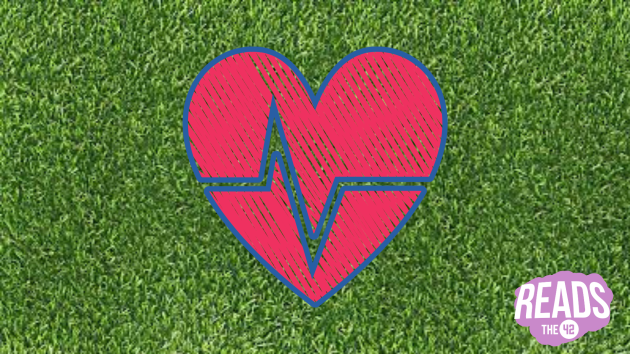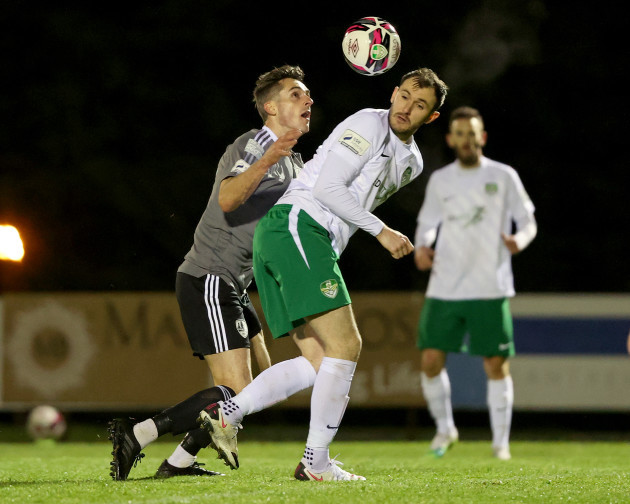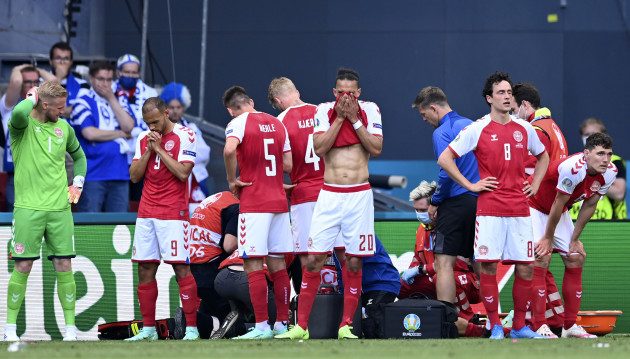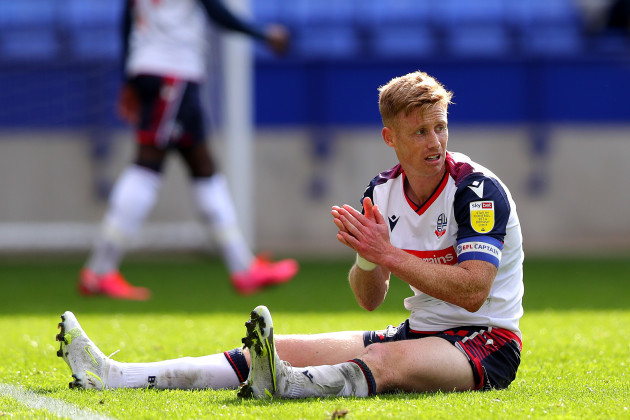TO WITNESS an elite footballer suffering a cardiac arrest, as Christian Eriksen did last weekend, felt deeply shocking and highly unusual.
However, in general, cardiac arrests are hardly uncommon. According to the Pre-Hospital Emergency Care Council’s website, almost 5,000 people die annually from sudden cardiac arrest in Ireland alone.
There have also been some examples of athletes who suffer cardiac arrest at various levels.
It will be six years in September since Cathal Joyce’s near-fatal experience.
The Athlone GAA footballer was just 25-years-old when a defibrillator helped to save his life amid a match against Rosemount.
While relieved that he ultimately pulled through, watching Eriksen’s collapse brought back some bad memories for Joyce of that day at Cusack Park in Mullingar.
He had just started warming up and kicking a few balls around before a feeling of dizziness came over him and his coordination started to go.
“I just said to one of the lads: ‘Will you bring me over to the dugout? I’m not feeling great.’ So he had to link me over to the dugout,” Joyce tells The42. “With that, my brother came over, he’s a physio. He asked me how I was, and I was just telling him how I was feeling. With that, my vision went and I collapsed on the ground. I had three rounds of CPR and one shot of the defibrillator.”
- For more great storytelling and analysis from our award-winning journalists, join the club at The42 Membership today. Click here to find out more >
Joyce was fortunate in that there were a couple of people on hand with medical expertise. In addition to his brother, Rosemount player Dr Patrick Boland, Athlone vice-chairman Gordon Brett and Athlone player Colm O’Leary, a Garda trained in CPR, all made important contributions.
His brother James said afterwards it was a “miracle” he was still alive.
“Quick intervention was key to survival,” Joyce recalls. “There was only enough battery in the defibrillator for one shot, but luckily enough, that’s all I needed. If I had needed another shot I was in trouble.
“Once you’re in cardiac arrest, you’re dead. Your heart is stopped. A defibrillator is there to restart the heart. It’s like a refresher button.
“A lot of people get mixed up with heart attacks and cardiac arrest — it’s a completely different thing.
“A cardiac arrest is an electrician’s job, it’s an electrical fault in the heart and a heart attack is a plumber’s job, it’s where there’s a blockage in the heart.
“You could be in the middle of a heart attack, and still be able to talk, but a cardiac arrest, you’re out. You’re gone.”
After several tests, Joyce was diagnosed with hypertrophic cardiomyopathy, described by mayoclinic.org as “a disease in which the heart muscle becomes abnormally thick (hypertrophied). The thickened heart muscle can make it harder for the heart to pump blood.”
“I was told I’d never play sport again,” remembers Joyce. “I was back playing six months later. And I owe a lot of that credit to The CRY Centre [Centre for Cardiac Risk in the Young Persons] in Tallaght. Straight in, you get a full [examination] and the doctor there talked to me straight. No messing around.
“During Covid, I went back and did cardiac rehab course in UCD myself, so I’m just finishing that at the moment. I’ll be doing a career change hopefully soon enough.”
healthy for the final. My 2trophies #winning #athlonegaa @JOEdotie @MidlandsSport @AntonSavageShow @todayfm pic.twitter.com/a2SAIDxzqr
— Cathal Joyce (@cathaljoyce) October 4, 2015
And is Joyce, now aged 30, still playing these days?
“Yeah, I played a match there last night. I’ll be training Thursday and I have another match Saturday. So it’s been all go.
“I’m not playing at the level I was, running for mad balls or doing 20-mile runs. But I can hold my own, I can play away, I’m grand.
“I’m still able to tog out for a match and train, and I’m not shaming myself, you know?”
He continues: “My main thing is the whole country is flooded with defibrillators, but they don’t look after them. Anybody can learn CPR from a child right up. It’s like riding a bike — you never forget.
“It’s such a simple thing and can play a major part in saving someone’s life. And to use a defibrillator — it tells you what to do if it’s working.”
And Joyce is hopeful the Eriksen incident will raise awareness of the issue while highlighting the importance of having defibrillators and people with medical knowledge for games at every level of the sport.
“You’ve people going back playing football there and they might not have done anything for ages. They might go back playing a bit of junior, because they’re after being locked up, just to get out of the house for something to do. And they’re putting their body under serious stress. I don’t know how people go from zero to 100. It has to be a gradual thing. You can do all the [precautions] that you want, but what is a cardiac screening? The top professionals, I’m guessing they would have gone through numerous tests as well. Especially with [Eriksen] moving club recently, he would have done a medical.
“But I get calls from people all around the country, their child has suffered [an issue] and they’re just wondering about my story: how did I get back? And they were told to be wrapped in cotton wool. I’m no doctor or anything, but I think you have to get out and live a little as well.”
Unsurprisingly, given that a lack of battery could so easily have cost Joyce his life, he is keen to emphasise the importance of the maintenance of defibrillators.
“We all get an alarm in case the house gets robbed. But it’s crazy, you have to get one and you have to look after it.
“So it’s just about awareness and having someone in charge of it. It doesn’t have to be the GAA club. The communities around them should have them, just to make sure they’re maintained and looked after, and that the batteries are working on them.”
And finally, did the near-death experience change Joyce’s perspective on life?
“It might do for someone else, but not me. I was always a go-getter. Whatever I wanted to do, I would have done it. And if I couldn’t achieve it, I would have given 100% and got as close as I could to it.
“But look, I would have been and still am very competitive sports-wise. So it’s great to get another chance, and I’ll finish football on my own terms when I’m ready.”
***
Cabinteely footballer Kevin Knight — brother of Ireland international Jason — noticed something was awry when his electrician father Paul came home early from work on St Patrick’s Day this year.
It had been a sunny day and an exhausted Paul went for a nap, with Kevin initially assuming his father was suffering from little more than fatigue due to the heat.
Kevin was the only other adult in the house and due to be picked up by his girlfriend Shauna shortly, when all of a sudden, his father began calling him.
The 28-year-old defender saw that Paul was struggling badly and even stopped breathing at points over the course of this traumatic event. He called 999 and under instruction from the woman at the other end of the phone, Knight began performing the CPR he had learned 12 years previously, while on the books at Leicester City.
“A lot of clubs in England teach it to their scholars and young lads that are over there. I don’t know if it’s a mandatory thing, but we had to do it.
“I just presumed all the other clubs had to do it. We only did it once now the whole time I was there.
“It wouldn’t be high on people’s lists [in the League of Ireland], especially if you’re a club that’s struggling with finances. You’re not thinking: ‘We need to be doing CPR courses,’ instead of getting the lads a coach to a match and stuff. It’s hard to justify it.
“I don’t know if there are many defibrillators around the League of Ireland. There are a lot of clubs fighting to get them. I know there’s trouble in our club trying to get it, and even get lads training with it.
“I know St John’s ambulance is always at the games, but I don’t know who else is trained [to act in such situations].
“I know I’m not trained. From movies, I know to stick it on their chest, shout ‘clear’ and then something happens. That’s about it.”
He continues: “Especially nowadays, the intensity in training is going up all the time. They’re training longer, harder and more frequently. So I don’t see why they wouldn’t start teaching every couple of months or every year, a refresher course. Just something simple.
“I can’t say what I learned 12 years ago [made the biggest difference], I just saw stuff on telly, people on documentaries performing CPR and stuff like that. It was everything like that in the one, just trying to remember what to do. You’ve seen it on the pitch, it’s as simple as that and can save someone’s life.
“Between calling the ambulance and someone getting there to do it is the most critical time. Even if you’re terrible at it, it’s better than not doing anything.”
The fact that it all happened so quickly, Knight adds, enabled him to remain calm amid this nerve-wracking moment.
“A lot of it was just adrenaline. It was the fact that I was the only one there. If I didn’t do something, he was just going to die.
“Not that it was easy, I didn’t really think about it, I just did it and then you just worry about it all after.”
An x-ray showed Paul required a stent in his heart — described by irishheart.ie as “a small wire tube which is expanded in the coronary artery and permanently helps to prop the artery open” — which was subsequently fitted.
“It was a lot more chilled out the day after. He was back, up and around, talking. He was sore, but it could have been a lot worse.”
Three months on from the incident, Paul is continuing to recover.
“The doctors told him to go back to work. I think he’s going back in July. But he’s in no rush, he’s happy with it.
“He is back driving, and he’s having a few drinks, especially in the hot sun.
“For a couple of weeks after it happened, he was all grey and gaunt, but he’s perfect now. He has a tan from sitting in the back garden all the time.”
And the incident inspired both Knight and his father to make some changes to their lifestyle.
“My dad was a very easy-going person. But behind the scenes, he used to stress about stupid things and I think he’s sort of calmed down now.
“I never really stressed about things anyway. Whatever happens happens, in my mind.
“But you’ve got to look after yourself, even with something simple, like the right food. He was doing it at a certain stage, but I think it was just years of physical abuse to his body taking its toll — too little, too late sort of thing.
“So I’ve started to eat right, just little things like brown bread instead of white bread, that sort of stuff.”
Knight also hopes the Eriksen incident can serve as a wake-up call in encouraging more people to learn CPR and other life-saving techniques.
“He’s an elite footballer, you know what I mean? If it’s happening to him, it can happen to anyone.
“I’d already seen it, but for people to see it that way on the pitch, it’s all the more real. If you did need a reason to learn CPR, there’s one right there.
“I’d be very surprised now if there wasn’t a big outcry [in favour of] more training for that.”
***
According to heartandstrke.ca, only 1 in 10 people survive cardiac arrests that occur at home or in public places.
Though not practising currently, with three young kids the priority, Ciara Doyle saw no shortage of horrific incidents in her time working as a nurse and the Dubliner recognised immediately what was happening in the 42nd minute of the Denmark-Finland match last Saturday.
“My little boy Danny was watching the game and said: ‘Mummy, he’s actually falling there.’ So I switched my gaze to the telly and said: ‘Yeah, that’s an arrest, 100%.’ I think they only used one shock as well to get him back. He’s the luckiest man in the world.
“I thought he was dead straight away. The survival rate of cardiac arrest outside of the hospital is really low. I was not expecting him to pull through or to be awake and conscious coming off the pitch. I’ve only had one patient who survived a cardiac arrest and he was severely brain-damaged for the rest of his life. I haven’t had one actually pull through it and resume a normal life.
“Obviously, it’s horrendous that it happened to him or that it happens to anybody, but if something good is to come from it, it’s to raise awareness and say to anybody that’s in that situation: ‘Look, just have a go.’ Because even bad CPR is better than no CPR. And you don’t have to be trained to use a defibrillator. It basically tells you how to do it. So if you just have a go, it could be the difference between saving somebody’s life or not.
“Survival rates are very low, but they are going up in the last couple of years because there is more awareness about it. They say you don’t even need to give mouth to mouth anymore if you can just keep the heart going. So I think people were afraid or reluctant to start giving CPR to strangers, but they have said now that you don’t have to give breaths, you can just keep going with the chest compressions.
“If anybody gets encouraged to just sign up and do a course, there are loads online even. I think the Red Cross and Irish Heart do them
“Even my dad, he worked on building sites for years and did a basic life support course when he retired and he actually had to save my neighbour’s life through CPR.
“I don’t want to go into too much detail, but his heart stopped and he managed to get it back with CPR. By the time the ambulance came, my dad had got his pulse back and that was without the defib, so it reinforces the idea of just giving it a go.”
Doyle had her own traumatic experience at a restaurant a few years ago. She was on holiday in Portugal with her husband Eoin, a Dublin-born striker currently starring at Bolton, along with his former Sligo team-mate Danny Ventre and wife Charlotte.
Ultimately, her life was saved by the Heimlich manoeuvre.
“It’s a bit of an embarrassing story,” she recalls. “I was eating steak. I just swallowed it and it just got stuck and completely blocked off my airway.
“It was Eoin and Danny that both did it together. I don’t know which of them actually dislodged it in the end, but Danny had just done a basic life support course with Blackpool a few weeks before that. I taught Eoin myself how to do it, obviously with the kids and stuff, and thank God he listened. It’s embarrassing, but it worked, they saved my life.
“Eoin had to pull me out over the table, it was actually really scary. The two of them were taking it in turns — back slaps, abdominal thrusts and stuff like that.
“The whole thing only lasted about a minute and a half. It was obviously the scariest minute of my life.”
She continues: “I was alright physically [afterwards]. The people in the restaurant stood there, let it happen and just watched. I think they panicked as well. They called an ambulance, but by the time the ambulance came, it had been dislodged. So they just checked me over and did my blood pressure, but I didn’t want to go to the hospital. I was mortified. I just wanted the ground to open and swallow me up. But thank God Eoin and Danny had the basic training to do it.”
And incredibly, Doyle also has one other memory of a life-saving incident occurring before her eyes away from her work.
“70% of cardiac arrests actually happen in the home. It’s a huge stat to think that 7/10 people will have an arrest when there’s [likely] no one medically trained around them. That’s why it’s so important to sign up and do these courses.
“I was at a game years ago when Eoin was playing, a cup final. There was a man about three rows behind me and he [had a heart issue]. It was actually the anaesthetist from Sligo Rovers that jumped in. So just a really quick intervention saved his life. He was on RTÉ News a couple of months later having a pint of Guinness.”
For more great storytelling and analysis from our award-winning journalists, join the club at The42 Membership today. Click here to find out more >




